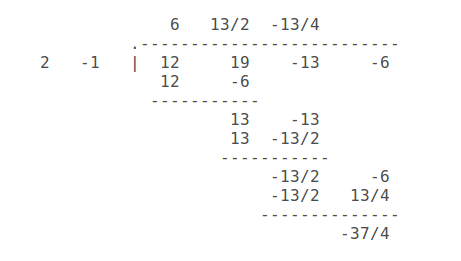How do you use synthetic division to divide #12x^3 + 19x^2 - 13x - 6# by #2x-1#?
1 Answer
Explanation:
Synthetic division of polynomials is similar to division of integers.

Write the coefficients of your dividend under the bar and the coefficients of the divisor to the left.
Choose the first number for the quotient so that when multiplied by the divisor it will match the first number of the dividend. In our case we write
Write the product
Bring down the next number
Choose the next number for the quotient so that when multiplied by the divisor it matches the leading number in the remainder. In our case we write
Write the product
We end up with a quotient
So:
Or:

